Charles Dickens is often called the inventor of the modern Christmas, not least with his perennial story of the miser Scrooge turned generous benefactor. But what is the real message that emanates through the pores of this story like the rich smell of a newly steamed Christmas pudding? The answer may surprise you.
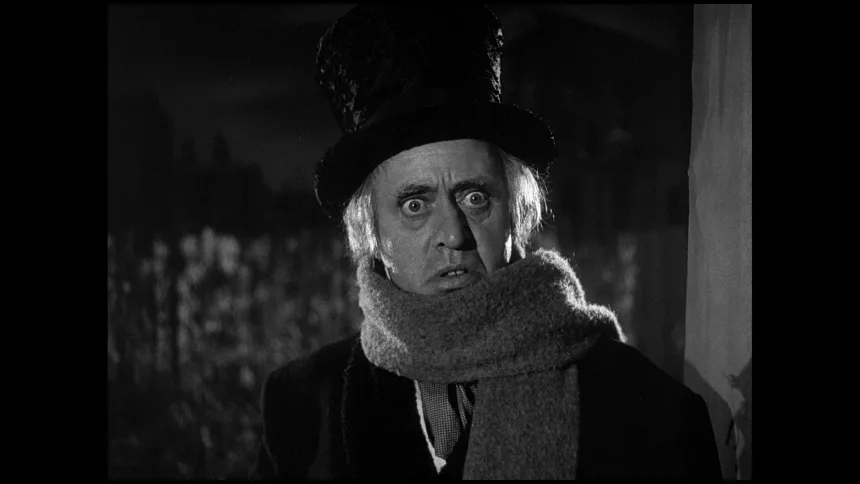
In the first televised debate between Boris Johnson and Jeremy Corbyn, the now ousted Labour leader was asked what he would leave for his opposite number under the Christmas tree. His answer was very telling – mostly of Mr. Corbyn’s simplistic world-view – because he chose A Christmas Carol by Charles Dickens, saying, ”…and he can then understand how nasty Scrooge was.” As we are in the season of revisiting this 1843 story, with the BBC’s 2019 dramatisation of the story being one of the more recent productions, perhaps it is time to reconsider what A Christmas Carol really is all about, because I think Corbyn, and many with him, has failed to understand that the story of Scrooge’s redemption, far from being a rebuke of private wealth, is in fact a celebration of a consumerist Christmas; a hymn to capitalism and spending money, and the happiness you gain from consumption rather than hoarding.
The story of A Christmas Carol is well known. Scrooge the miser is visited by four ghosts on Christmas Eve, three of whom show him Christmas past, present and future, and as a result, Scrooge is reformed from greedy, grabby miser to generous benefactor.
We tend to emphasize the transition from meanness to liberality in Scrooge’s attitude to other people. We make it fit into a familiar complaint about Christmas: ‘oh, it’s all about consuming stuff, it’s all about buying things, it’s too materialistic, too focussed on spending, we are forgetting the REAL meaning of Christmas’. But what is the real meaning? In a secular age, the religious content is largely part of the aesthetic backdrop. Baby Jesus over here, Coca-Cola’s Santa Claus over there.
What A Christmas Carol suggests, directly and indirectly, is that the consumption of goods and the happiness that can be had from it, is the real meaning of Christmas. The author spends 40 lines deliciously describing produce on offer in shops, then one feeble line stating that people went “to church and chapel”. The story certainly criticises miserliness, but it also, in Dickens’ masterly way, criticises the hypocrisy with which our society, steeped as it is in a derivative Christian morality of poverty as a virtue, sees the acquisition of wealth as evil, but the spending of wealth, ironically, as a great good (especially the spending of other people’s wealth, as in Corbyn’s case).
This is beautifully expressed during the vision of the first didactic spirit, when the young Scrooge’s fiancé decides to break off the engagement because of his dedication to making money, referring to “a golden idol” having taken the place of his former love of her.
Young Scrooge replies:
“‘This is the even-handed dealing of the world!’ he said. ‘There is nothing on which it is so hard as poverty; and there is nothing it professes to condemn with such severity as the pursuit of wealth!’”
It has been said of Microsoft founder Bill Gates that he was never so much celebrated for creating his business and making all that money, as he was for giving some of the money away. This is a modern echo of the Scrooge-story: the Old Scrooge is a miser, yes, but he is also a creator. Not only has he amassed a fortune, he has built a business that employs at least one man directly and perhaps many others indirectly by investments and financing. Mr. Cratchit, who in his toast to “the Founder of the Feast”, referring to Scrooge, shows an understanding of this. But this is not what the novella primarily celebrates, as Mrs. Cratchit’s acid response makes perfectly clear.
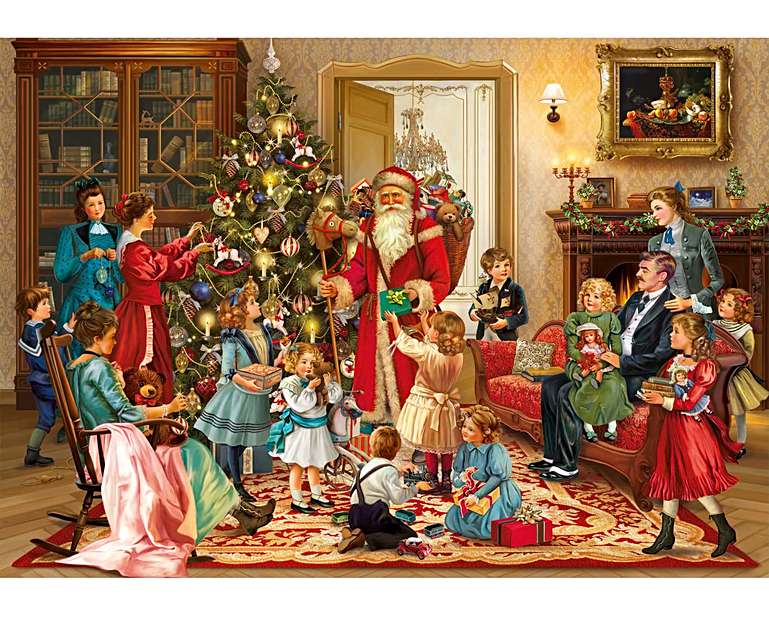
Let’s look a little closer at exactly how A Christmas Carol makes consumerism the real meaning of Christmas:
The first scene of the story is set in Scrooge’s counting house, after an introduction that leaves the reader in no doubt as to what kind of man Scrooge was: “A squeezing, wrenching, grasping, scraping, clutching, covetous old sinner!”.
In the counting house there are two fires: a small one in Mr. Scrooge’s office and an even smaller one in the cell occupied by his clerk. The clerk is not allowed to replenish the fire on pain of unemployment. In other words, the first concrete example of the deficit of Scrooge’s character is his failure to consume more fossil fuels, thus reducing his company’s carbon footprint – perhaps old Scrooge should be a patron saint for our modern day puritans in the Extinction Rebellion movement.
His nephew enters to make the following feeble argument for Christmas: “‘…though it has never put a scrap of gold or silver in my pocket, I believe it has done me good, and will do me good; and I say, God bless it’”. Scrooge naturally, as he should, rejects this argument with one of his many (in)famous “humbug!” ejaculations.
The next to make an argument for consuming more are two gentlemen, themselves portly embodiments of over-consumption. They implore Scrooge to part with the money he has made to buy meat and drink for the poor, because, as they put it, this is a time of year when, “‘Want is keenly felt, and Abundance rejoices.’” Old Scrooge, in another of his rather pointed remarks replies, “‘I don’t make merry myself at Christmas and I can’t afford to make idle people merry.’” In other words, consuming more could have made him merry – or happy – but he doesn’t go in for that.
After this scene there is a whole paragraph describing how the festivities are being prepared across the city, with descriptions of glowing shop windows, of poulterers’ and grocers’ doing trade as a “glorious pageant”. The Lord Mayor orders his “fifty cooks and butlers to keep Christmas as a Lord Mayor’s household should” whilst the humble tailor and his wife stir their pudding in happy anticipation. In other words, the trade and consumption of produce is creating the warm glow of happiness across an otherwise cold city.
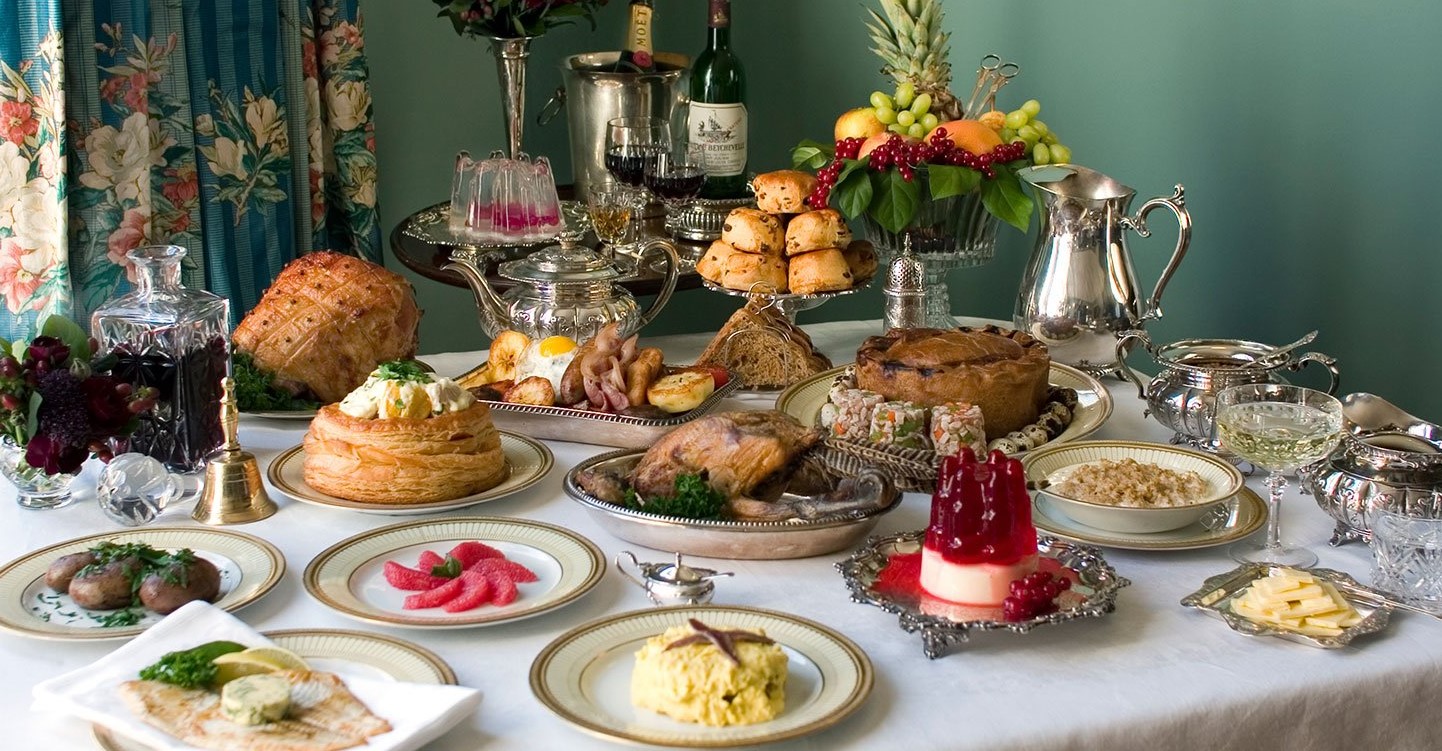
The contrast from the glowy happiness of consumer goods to the gloomy, dark house where Scrooge lives his ascetic, non-consumerist life, is stark and forms the backdrop for the visit of the first of the three didactic spirits – a strange light-emitting creature. And light is then cast upon Scrooge’s past, where his old employer, Mr. Fezziwig, as the first spirit puts it, “‘[…] has spent but a few pounds of your mortal money […]’,” to create a Christmas Eve feast of medieval proportions and abundant jollity. Then, in the next vision – one that most certainly is in breach of the General Data Protection Regulation – Scrooge is shown a scene of domestic bliss from the life of his former fiancé. Her husband, one who clearly must have worked at least as hard as Scrooge to maintain what appears to be a very large family in comfortable surroundings, enters “…laden with Christmas toys and presents.” More frivolous consumerism!
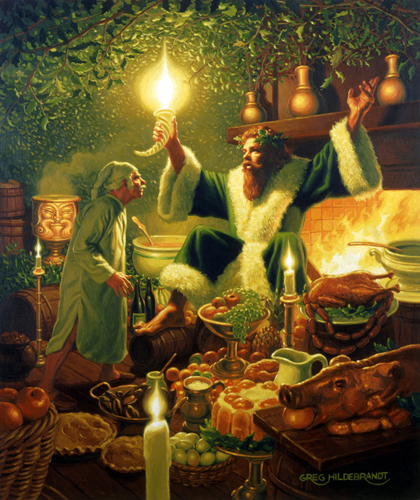
The advent of the second spirit proves even more overtly consumeristic: this is where Dickens goes to town describing consumer goods on offer; the poultry, the game, the fish, the fruit, the “broad-girthed Spanish onions, the “great, round, pot-bellied baskets of chestnuts, shaped like the waistcoats of jolly old gentlemen,” and so on and so forth for 40 consecutive, delicious lines. The depiction of eager customers “crashing their wicker baskets wildly” could have been from the Aldi Black Friday sales. The spirit shows him some humble Christmas gatherings, but the main scene of that vision is the house of aforementioned nephew Fred, where a solidly middle-class feast is held, with food and wine and furniture and a piano.
George Orwell, in his essay on Dickens from 1940, makes the point that Dickens seems to know very little about work. He says, “It is not merely a coincidence that Dickens never writes about agriculture and writes endlessly about food. He was a Cockney, and London is the centre of the earth in rather the same sense that the belly is the centre of the body. It is a city of consumers.” And goes on to say, “Everything is seen from the consumer-angle”. This is certainly true in the vision of the second spirit.
But the story then moves to the more austere vision of the third spirit, that of Christmas Future. The two main points from that part are of course poor Tiny Tim’s death, genuinely moving in that way only Dickens can do it – as Oscar Wilde said of another Dicken’s story, ‘One must have a heart of stone to read the death of little Nell without laughing’. The other main point is the happiness caused by Scrooge’s own death. This clinches Scrooge’s conversion, and he wakes up on Christmas morning feeling happy, merry and giddy. His first act as the born-again Scrooge is to lean out the window and engage the nearest boy to tell the poulterer in the next street he wants to buy the largest prize turkey. The next act is to donate to the charity he rejected the day before, whose purpose was to buy food and drink for the poor to celebrate Christmas. He then attends his nephew’s dinner (more consumption of food and drink). The next day, he raises his clark’s salary (increasing the money supply and therefore consumption) and instructs Cratchit to “‘Make up the fires, and buy another coal-scuttle before you dot another i, Bob Cratchit!’”. Need I say it? He is increasing his carbon footprint and destroying the lives of Swedish girls everywhere! How dare he? The story concludes with Tiny Tim surviving and Scrooge knowing “how to keep Christmas well”, and we all know what that means by now. He started spending money and it bought him happiness and friends, as even Jesus Christ said according to Luke, “…use worldly wealth to gain friends for yourselves.”
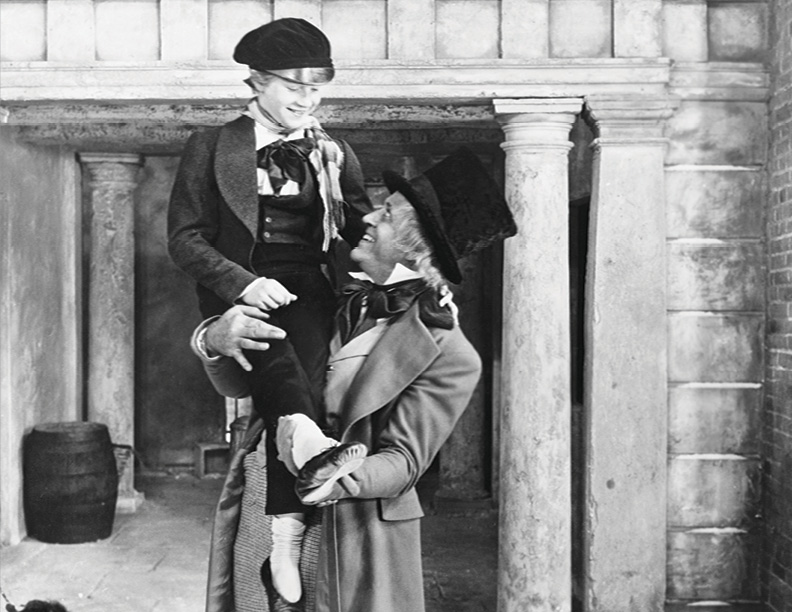
Apparently Dickens’ inspiration for Scrooge came when walking through a cemetery in Edinburgh, where he chanced upon a headstone inscribed with “Ebenezer Lennox Scroggie – a meal man”. Old Scroggie had amassed a fortune dealing in corn, and was actually a generous benefactor, but Dickens misread it as “a mean man” and commented in his notebook on how tragic he thought this epitaph was. It is ironic that a story so widely misread and misunderstood as A Christmas Carol, was itself begot by a misunderstanding. Fake news is nothing new, it seems.
Again I will quote Orwell, who I think got Dickens just right, writing here about Hard Times:
“…its tendency if anything is pro-capitalist, because its whole moral is that capitalists ought to be kind, not that workers ought to be rebellious. […] His whole ‘message’ is one that at first glance looks like an enormous platitude: If men would behave decently the world would be decent.”
But what is “decent”? Scroggie, the Scotsman whose tombstone inspired Dickens, is said to have done more good through his business than through his philanthropy. If you merely give away all your money without investing them, no new businesses or jobs will be created. The message for this, and any, Christmas, that I would like to take away from my reading of A Christmas Carol, is therefore that money can indeed buy happiness, and that it is a natural human response to abhor suffering in our fellow men. Therefore, as you spend your money to have a modern version of the pre-Christian mid-winter Yule-feast, do so with a healthy conscience: you are buying happiness for yourself, for those who receive the presents and hospitality, for those who work in the shops, who owns the shops, who work in the factories and farms producing the goods, and in addition, giving to a charity of choice buys you a nice, warm glow of self-satisfied virtue, if you need it.
Whatever rebellious crusties say, spending money, as Scrooge discovered, makes you and everyone else happy. A very Merry Consumer Christmas to you.

[This article was printed in the Colchester Gazette on Monday 23rd December 2019]